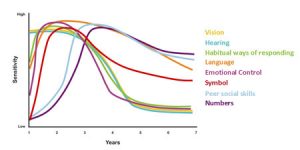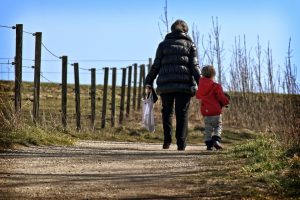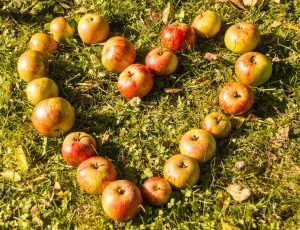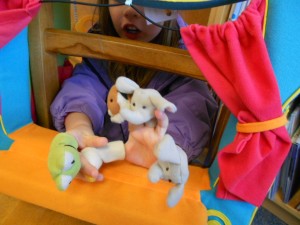Today’s new year’s resolution is brought to you by the letter Y: you are your child’s greatest learning resource so take care of you. While this sounds next to impossible for parents, especially when comes to the issue of getting enough sleep, it’s far too important to ignore. And we all need to be there to help.

This post has been inspired by words of advice from people who have been there and done that, as well as by some awesome new research from professionals. For those of you who prefer pictures to words, here is a graph that shows when children’s brains are the most sensitive for different kinds of learning.

If you look at the start, brains are revved up and ready to go for vision, hearing, ways of responding and language. This isn’t like a switch that gets turned on at birth, the learning has already been happening! Babies not yet born can detect sound, so much so that their crying will have the accent of the language they have been hearing. This comes from hearing voices, especially those of the parents. When it comes to food preferences of young children, kids tend to choose ones that are familiar. This is a result of foods they have ‘tasted’ from what their mothers have eaten before birth.

That’s just before birth. Children’s brains are learning at an astonishing rate after when they can interact with the world and others around them. Because learning is a developmental process, parents and caregivers are essential. “Scientists now know a major ingredient in this developmental process is the ‘serve and return’ relationship between children and their parents and other caregivers in the family or community.” (InBrief: The Science of Early Childhood Development, Center on the Developing Child, Harvard University) This relationship nurtures not just the heart, but the developing mind.

School is just an expansion of the process that has already started for kids from within their families. The classroom teachers aren’t the first, parents are. When kids do get to school, one of the factors that most influences school success is parent involvement.
As parents, you are your child’s greatest learning resource. Taking care of yourself isn’t a selfish luxury. It’s vital. Fortunately, Nature has built in a wise plan. The brain learns best through play. Besides sleep, play is also a way to take care of ourselves. How will you and your child play today?



